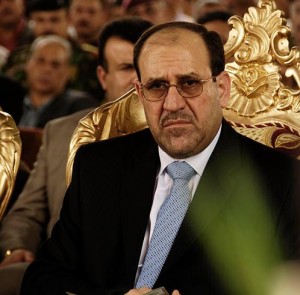Ten years after the U.S. invasion, Iraq’s inter-sectarian political experiment is in jeopardy. Prime Minister Nouri al-Maliki’s Shiite State of Law coalition remains in control, yet his government has come under excruciating pressure. In recent months, a wave of anti-government Sunni Arab protests, Cabinet boycotts by Shiite Sadrists, Sunnis and Kurds, coupled with rising sectarian violence and the steady withdrawal of Sunniministers, have threatened the longevity of Iraq’s political experiment. But despite rising sectarianism, perceived marginalization of Sunnis and jihadist violence, there are indications that Iraq’s Sunni tribal leaders are hesitant to abandon the political process and thrust Iraq into another war.
The March 29 Baghdad car bomb attacks targeting Shiite mosques underscore persistent efforts by Sunni jihadists to force this war. By increasing violence and radical sectarianism, Sunni jihadists are aiming to weaken the central Shiite-led government, force a Shiite-militia response, and Sunnis to take up arms against the state at a time of instability across the region. Despite counterinsurgency efforts by the Iraqi security forces and military, they remain largely unable to deter or prevent militant attacks, such as the coordinated mass assaults witnessed in the capital on March 13. Jihadists can largely strike at will.

In addition to rising violence, persistent Sunni protests over a variety of issues continue to exacerbate sectarian tensions. Their demands vary from further rights, an end to the country’s terrorism and de-Baathification laws, to autonomy. Above all, protesters demand an end to the perceived marginalization of the Sunni community. It is hard, however, to see how such a perception will dissipate given mounting sectarian violence across the region.
Additionally, recent al-Maliki measures against Sunni ministers, on top of postponing local elections in Sunni-majority provinces and the continued targeting of local candidates, have only compounded Sunni restiveness. According to reports, at least 11 candidates for upcoming elections have been assassinated. Political candidates remain a high-level target for Sunni jihadists aiming to settle scores, deter cooperation with the government and weaken the traditional leadership of Iraq’sSunni community.
If such a strategy increasingly materializes, Iraq’s Sunni political leaders could be pressed to fall in line and replace the ballot box with an AK-47 to advance communal interests.
Despite increasing sectarianism and hostility toward the Shiite-led Iraqi government, there are signs that Sunni tribes remain committed to the political process. The recent shunning of protest leaders Saeed al-Lafi and Ali Hatim al-Sulaiman highlights internalSunni feuds, likely over strategy and a surge in radicalism. This was also showcased by the reported withdrawal of so-called radical al-Qaeda affiliates from a Sunni protest in Anbar on March 26 after protesters allegedly rejected violence.
Many traditional Iraqi Sunni leaders are likely interested in mitigating the surge in terror, given the threats that radicalism poses to their continued influence. The SunniEndowment and the Anbar Provincial Council welcomed reports that the leadership of the Anbar protest movement and the federal government will meet to discuss protesters’ demands. The Anbar Provincial Council also said that negotiations would reveal who within the Sunni protest movement advocated foreign agendas by refusing to deal with the government. It also remains a possibility that al-Maliki seeks to negotiate a settlement to end the current spate of protests ahead of further spillover from the war in Syria. Although it remains unclear whether Sunni leaders will be satisfied with negotiations, efforts to strike a compromise underscore increasing concerns over influence.
While al-Qaeda’s efforts to radicalize the population are underway, the Iraqi government and Sunni tribal elements, albeit for different reasons, are still likely to resist in the near term. The latter may not be totally supportive of Iraq’s government; however, they largely remain hesitant to risk the destruction of their communities, let alone their influence, by exacerbating violence. Whether to further Sunni secession or clout, a sectarian war would be a bloody game changer, especially for both the political process and the concept of a unified Iraq. Although it remains to be seen how Iraqi politics will effectively continue in the face of increasing sectarianism and violence, the bigger question is if Iraq can resist another war.
Concerned about nationwide stability in Iraq? Click here to receive ongoing intelligence updates.